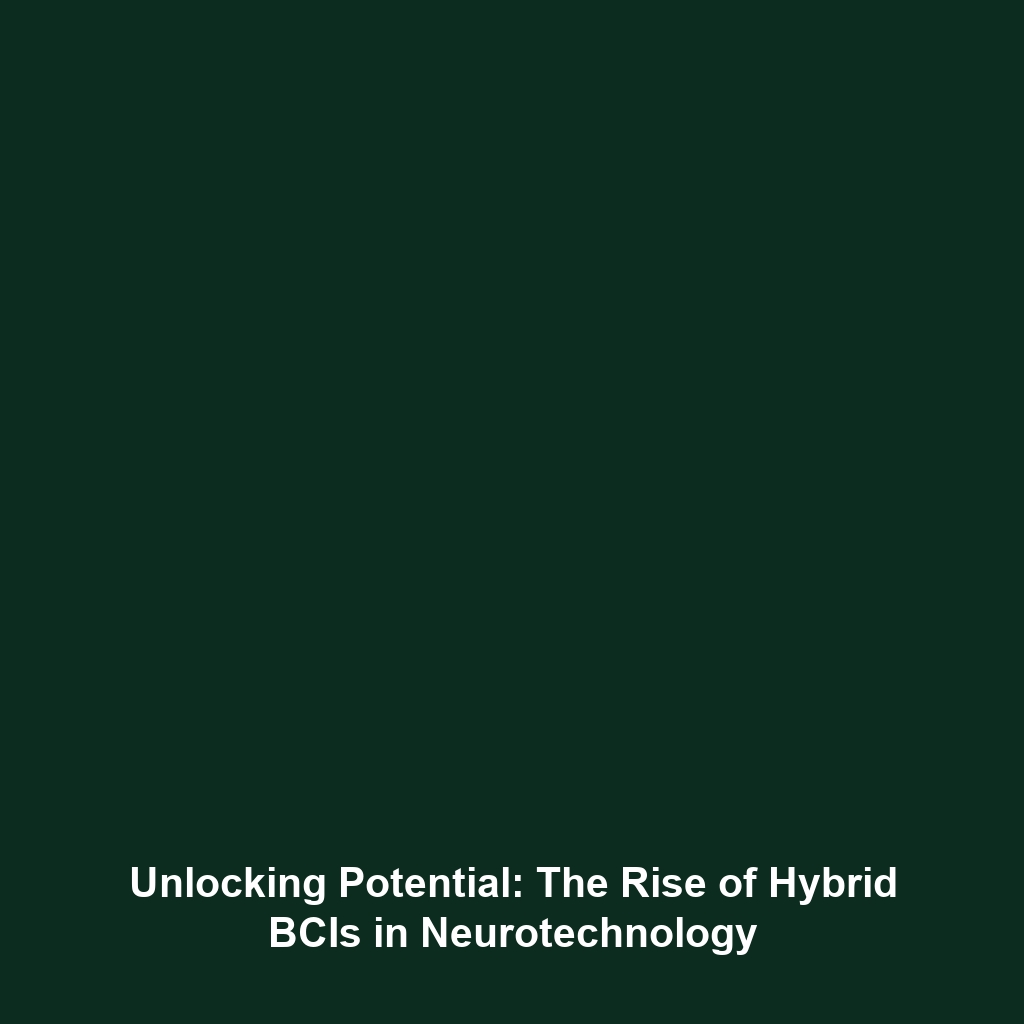<>
Hybrid Brain-Computer Interfaces: A New Frontier in Neurotechnology
Hybrid Brain-Computer Interfaces (BCIs) are revolutionizing the way we understand and interact with technology. By merging brain signal processing with external devices, these innovative interfaces facilitate improved communication and control for users. As the field of Brain-Computer Interfaces evolves, Hybrid BCIs are emerging as essential tools in both clinical and non-clinical settings, revealing exciting possibilities for enhancing human-computer interactions. In this article, we will delve into the key concepts, applications, challenges, and future directions of Hybrid BCIs.
Key Concepts of Hybrid BCIs
Hybrid BCIs combine various types of brain signal acquisition mechanisms, including:
- Invasive Methods: These involve implantable devices that directly interface with the brain, providing high-resolution data.
- Non-Invasive Methods: This includes surface EEG (electroencephalography) systems that can capture brain signals without surgery.
- Machine Learning Algorithms: Used for decoding brain signals effectively and improving the interface’s responsiveness.
By integrating these methods, Hybrid BCIs can achieve greater accuracy and adaptability, making them a significant advancement within the realm of Brain-Computer Interfaces. The synergy of different techniques allows for a more robust understanding of neural signals, which is crucial in optimizing various applications.
Applications and Real-World Uses of Hybrid BCIs
The applications of Hybrid BCIs in the field of Brain-Computer Interfaces are numerous and impactful:
- Assistive Technologies: Hybrid BCIs enable individuals with mobility impairments to control prosthetic limbs or wheelchairs using their thoughts.
- Neurological Rehabilitation: These interfaces are employed in therapeutic settings to assist stroke or spinal injury patients in regaining motor function.
- Gaming and Entertainment: Developers are utilizing Hybrid BCIs to create immersive experiences, allowing users to control virtual environments through brain activity.
In each of these domains, Hybrid BCIs showcase how advanced interactions derived from Brain-Computer Interfaces can improve quality of life and enhance user capabilities.
Current Challenges in Hybrid BCIs
Despite their potential, Hybrid BCIs face several challenges:
- Signal Complexity: The intricate nature of brain signals makes decoding difficult and requires sophisticated algorithms.
- Invasiveness: Invasive methods, while effective, carry risks associated with surgical procedures and long-term implantation.
- Ethical Considerations: The use of brain data raises concerns regarding privacy and consent, particularly in therapeutic and commercial applications.
- Technical Limitations: Current technology may struggle with real-time processing of complex signals, affecting responsiveness.
Future Research and Innovations in Hybrid BCIs
The future of Hybrid BCIs promises exciting breakthroughs, including:
- Advanced Neuroimaging: Innovations in imaging technologies may enhance brain signal acquisition and interpretation.
- Wearable Technology: Development of portable, non-invasive Hybrid BCIs that can be used in everyday settings.
- Enhanced Machine Learning Models: New algorithms will improve signal decoding, leading to faster and more accurate responses.
As research progresses, these innovations can significantly shape the future landscape of Brain-Computer Interfaces, leading to greaterintegration into daily life and enhanced capabilities.
Conclusion
Hybrid Brain-Computer Interfaces represent a significant advancement in the field of neurotechnology. By combining various methods of brain signal interpretation, these systems improve accuracy and usability in numerous applications. As research continues to evolve, Hybrid BCIs are poised to transform how we interact with technology and enhance our capabilities. For further insights, explore our related topics on assistive technologies and neurological rehabilitation.
